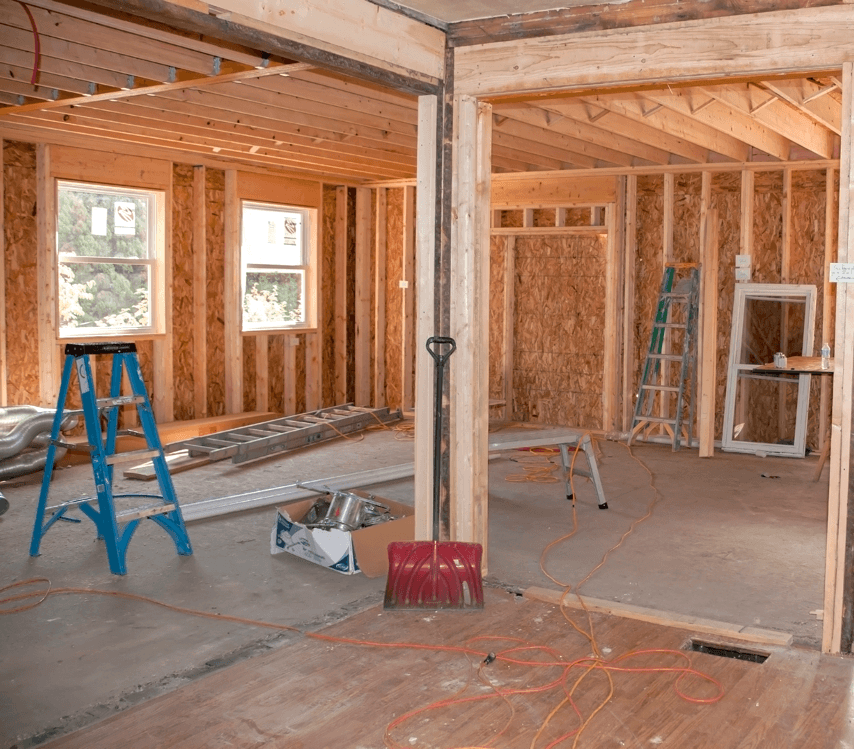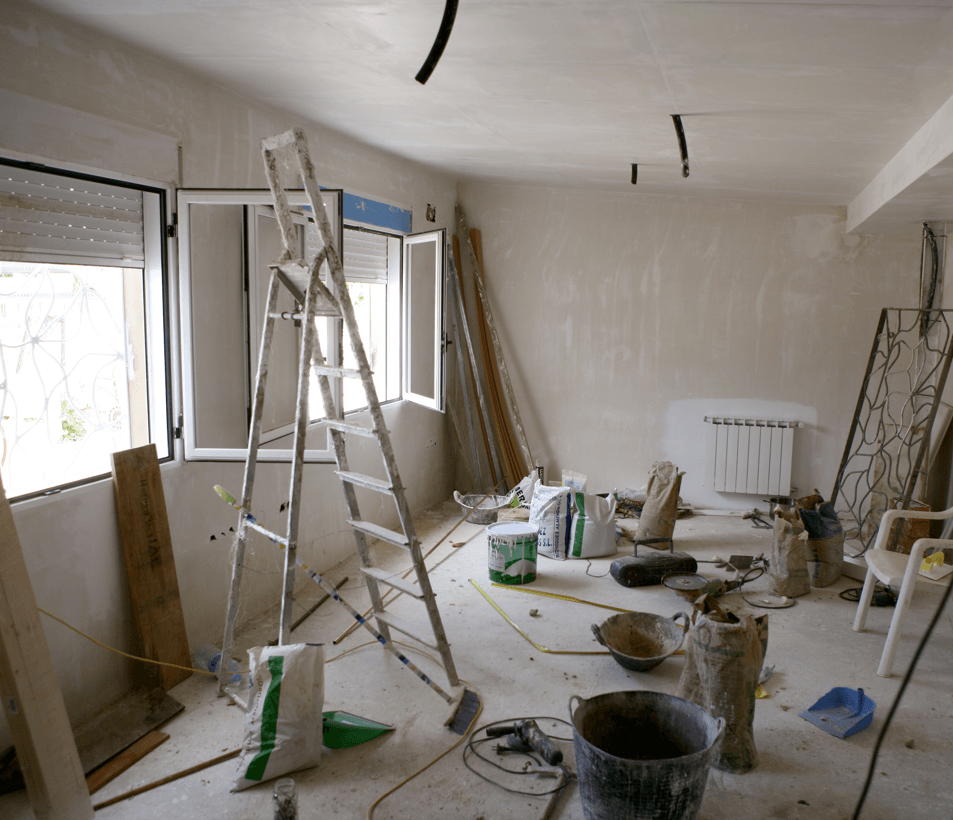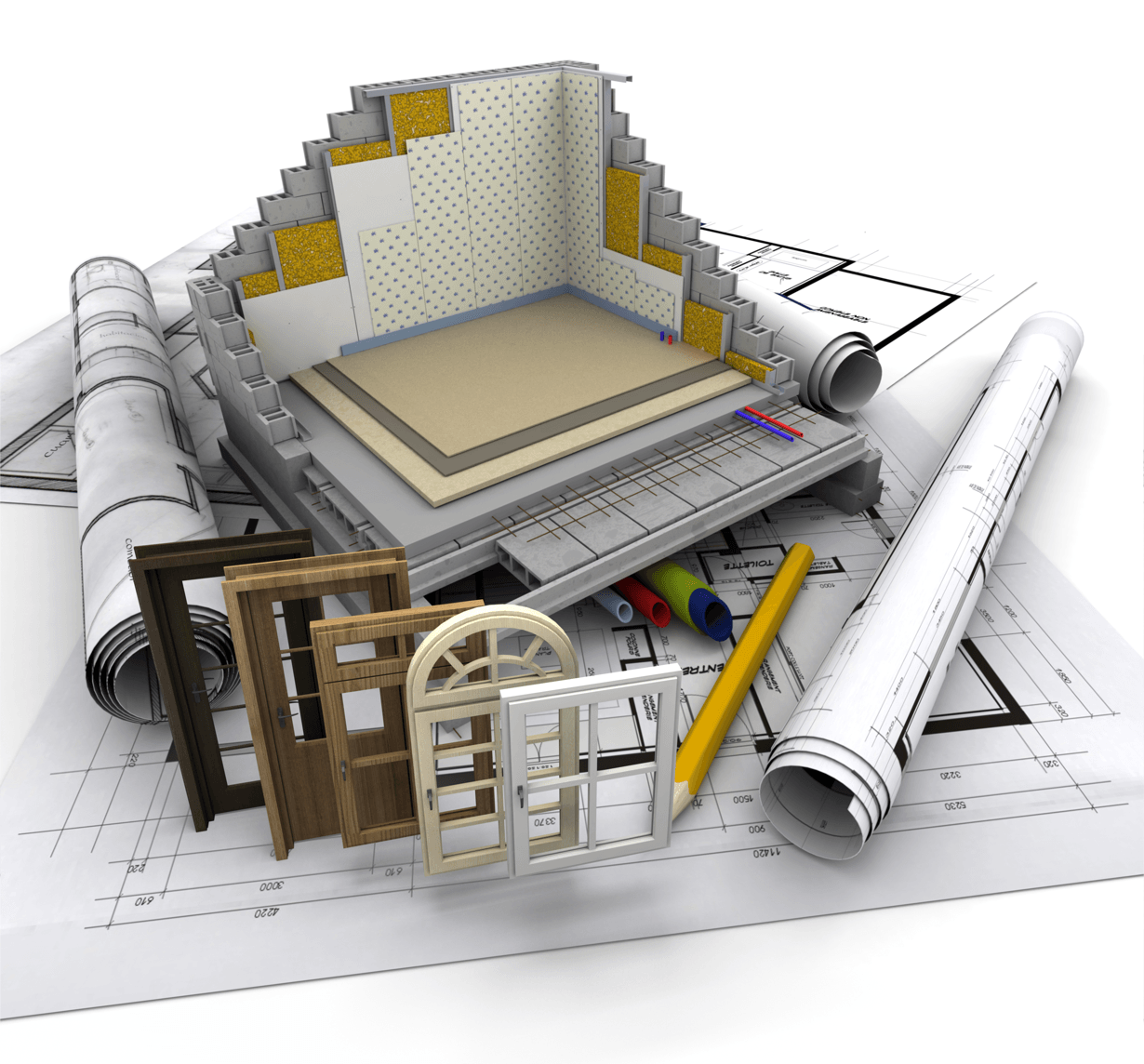At some point, every house begins to lose its lustre. Cracks start appearing, appliances get worn out, paint gets chipped, and the interior of your home starts looking old, frumpy, and worn-out.
But when is it worth it to renovate and when is it better to start over? How do you look at your fixer-upper and decide if you should put in the time and money to fix it, or make the decision to build a brand new home?
We’ve given you some food for thought below.
 Start at the Foundation
Start at the Foundation
One of the most important factors when deciding to “reno or demo” is how old your home is. A house built 20-30-50 years ago was most likely showing in its appearance, or the main systems of the home are starting to show their age.
If renovations mean you have to get down to the very foundation of the house, the load-bearing walls, the basement, or doing major rewiring, it’s usually going to be pretty expensive to renovate.
Other significant problems that can be costly to renovate include structural damage such as leaky roofs, broken sewer lines, persistent mould and mildew, and water damage, especially if said damage has gotten inside the walls and into floors.
On the other hand, if you build new, your foundation is going to be very sturdy with the bonus of being backed by a new home warranty.
To keep things simple, look at the rooms in your current house. If you want to change three or more rooms, or have an unfinished basement you’re wanting to completely renovate for more living space, it’s probably best to save yourself the hassle of turning your house into a construction zone and putting tens of thousands of dollars into a house with old bones that will take a lot of work to modernize.
Code Enforcement
If all you want to do is put in some new cabinets and change the paint colour of the walls, the only factors to really consider is the cost of the materials and the labour. Usually, these kinds of renovations can be done over a long weekend. However, if you’re not the DIY type, be sure to contact local professional contractors to get estimates so you can get an idea of what your renovation project will cost.
However, anything more substantial will require compliance with local building codes, including rules on window glazing, the width of your doors, the kind and quality of the insulation you use, and the efficiency of your appliances, to name just a few.
If you look at the cost of buying a new home and divide it by the square feet of interior space, you can get a rough idea of whether renovating or buying a new home is cheaper.
Another important thing to remember is some renovations may not be permitted according to your local, provincial, or national building code regulations. This is why the idea of building a new home from the ground up is such an appealing option! You can get what you want, have the luxury of moving into a home covered by a great warranty, and don’t have to worry about overseeing a major home renovation project. Just let the experts take care of the building process while you get excited about moving into a home that’s made just for you.
 Other Factors to Consider
Other Factors to Consider
Beyond just the financial cost of the materials and labour, here are some other things you’ll want to consider.
Do you want to build out from your existing home? Adding something to the top of your home is cheaper than adding width to your home.
Is there room for workers to perform the renovation? Living close to neighbours can cause disturbances, let alone the space you’ll need for trucks and materials that need to be brought in.
Are you replacing systems? Renovating or replacing the electrical, plumbing, and/or environmental control (heating and air conditioning) systems is an expensive and time-consuming job. For example, just having rewiring done in an older home can cost up to $7,000. Why not save what you would spend on updating old systems and use your equity to move into a brand-new home with modern and energy-efficient building materials?
Another thing you’ll want to check on is environmental impact rules. Some cities and provinces have specific requirements about how old materials need to be recycled or disposed of. See if you can re-use or recycle existing materials. This will save you substantial amounts of money but may require finding a contractor with specific experience.
Who will oversee the work? Letting workers do everything without the homeowner on site is a recipe for disaster. You will be out of the loop and if something is done in error, you may not find out until after the work is completed.
Another thing to keep in mind is that you may not be able to live in your home for a period of time, depending on the type of renovations being done. Staying at a friend’s house or a hotel is something that will disrupt your normal life and cost you money. The best way to avoid this is hiring someone you trust, preferably someone referred to you from a friend or family member who’s had a good experience, to get the work done as quickly as possible.
If the renovations you have in mind are more cosmetic than anything, such as painting and adding new fixtures, you may be able to do it yourself.
 Types of Materials
Types of Materials
Whether you decide to renovate or to build new, you have to decide more than just what the final outcome will look like. Every choice of materials, appliances, and other new items will make a difference.
Do you want to go with “greener,” more environmentally-sustainable methods and building techniques? Do you want to invest in higher quality appliances that cost more initially but will save you money in the long run due to lower utility bills?
It really comes down to whether you want to pay more upfront now for high-quality materials and recoup those costs later or stick with cheaper materials to make the total renovation costs less expensive. The other option is getting the same high quality materials and building methods all throughout your home if you build new, and not just in the areas you’re renovating.
Estimating the Costs of Building New
Choosing to build new also gives you a lot of flexibility in the final cost because you have the option to adjust how much you’re paying, through the choices you make. If you want particular upgrades, that will be an added cost, but you can also apply that power conversely and choose more budget-friendly features.
There are a lot of things to take into account when pricing for a new home. The big takeaway is new home builds will use the most efficient, high-quality materials for the entire home as the standard, making it more sustainable overall (not to mention, again, it’ll be backed by a new home warranty).
It’s a matter of deciding what you’re able and willing to pay now, in order to see how new home building materials save you money in the future. Because you’ve likely already built up a good amount of equity in your current home, why not invest it into a newly built property that can appreciate in value without you doing anything, instead of fixing things?
 Benefits of Building New
Benefits of Building New
We’ve mentioned the new home warranty a few times because it really is a major component with it comes to building new – giving homeowners some serious peace of mind.
But there’s more to building new than just your warranty.
Building your new home means you have much more opportunity for customization, choosing colours and finishes, adding a basement or in-law suite, and more. You get to choose the ideal floor plan for your family; maybe you’ve been begging for a second-floor laundry room, or you love the look of an open concept main floor.
You also have the chance to pick the perfect community – and new developments offer their residents some great perks. We’re talking playgrounds, green space, walking trails, water features, new amenities – your family is set!
Realistically, a new home home build is more affordable than many people realize.
Ultimately…
Only you can decide whether it’s better to renovate or to buy a new home. As with any important decision, carefully assess all your options. Do your research and get estimates on labour, materials, and other costs. Look at comparable new homes on the market and factor in your moving costs. Speak to builders and developers and get an idea of what the total cost of building new will cost you. When you’re fully educated on all of your options, you’re sure to make the right decision.
Originally posted July 25, 2017, updated March 12, 2019.
{{cta(‘f6deeeea-4500-4664-ade7-35ccd44e93f8′,’justifycenter’)}}
